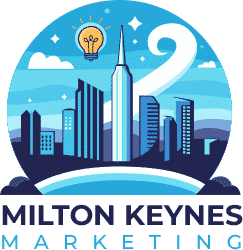PPC Package Guide for Local Business Growth
Practical guide to PPC packages in Milton Keynes - structure, keyword strategy, landing page optimisation and measurement to drive local leads.
PPC Packages: A Practical Guide for Milton Keynes
Milton Keynes Marketing helps local businesses in MK and beyond to get more value from paid advertising. This guide explains PPC packages, how they’re structured, and how to choose the right option for your ambitions.
As a leading digital marketing partner in the region, we explain the benefits of clear, outcome-focused PPC structures. You’ll discover how these packages translate into better visibility, more traffic, and higher-quality leads.
Strategic PPC Packages for Local Businesses in MK
Every business faces different challenges and opportunities in the digital advertising space. The right PPC package aligns with your objectives, budget, and timeline, while delivering consistent performance over time.
This guide lays out how Milton Keynes Marketing designs PPC packages for small firms, mid-market brands, and larger organisations operating in MK. It covers what’s inside each package, the benefits you should expect, and practical advice for selecting a plan that fits your growth goals.
PPC Packages Defined: Structure, Scope, and Purpose
PPC packages are structured service offerings designed around paid online advertising. They range from basic setup to full multi-channel management, with a clear path from discovery to optimisation.
For Milton Keynes businesses, these packages provide predictable budgets, repeatable processes, and a faster route to measurable outcomes. They are designed to save time, reduce waste, and improve the alignment between ads and business goals.
PPC Framework: Discovery, Setup, and Deployment
A well designed package starts with discovery, followed by setup and deployment, ensuring every decision reflects business goals. This sequence creates a foundation that supports sustained growth over time.
With Milton Keynes Marketing, you gain clarity on objectives, audiences, competitive dynamics, and success metrics from day one. The framework then guides practical execution across channels, bids, and creative delivery.
Components of Effective PPC Packages for UK Businesses
Key components drive results, from keyword research to landing page optimisation and conversion tracking. Each element is designed to improve relevance, user experience, and return on investment.
These components form a cohesive system that keeps campaigns efficient and accountable. Our approach integrates strategy, creative, technology, and reporting into a single, transparent service.
Keyword Research: Tools, Techniques, and Intent
Keyword research identifies the terms potential customers use and maps them to intent. It is the foundation for bids, ads, and landing page alignment.
We use tools like Google Keyword Planner, SEMrush, and Ahrefs to map search volume, competition, and relevance. This process supports prioritisation of high-value keywords and effective negative keyword strategies.
Ad Creation: Crafting Messages That Convert
Compelling ad copy is central to attracting attention and driving clicks. We craft headlines, descriptions, and calls to action that reflect user intent and brand value.
Ad types include text, display, shopping, and video, each tailored to campaign goals and audience preferences. Our approach ensures consistency with landing pages and overall user experience.
Landing Page Optimisation for Conversions
Landing pages must be fast, focused, and persuasive to convert traffic into leads or sales. We optimize content, visuals, and CTAs for maximum impact.
We emphasise clarity of purpose, relevance to ad copy, and minimal friction in the user journey. A/B testing helps us identify the best performing variations for your audience.
Types of PPC Packages to Suit Different Growth Goals
No two businesses share the same growth journey, and our PPC packages are designed to scale with your ambition. Each tier offers a different level of strategic depth, execution, and analytics.
Whether you’re aiming to grow awareness, generate qualified leads, or boost online sales, there is a package that matches your needs and resources. We tailor the structure to ensure you get consistent value and clear milestones.
Basic, Standard, and Premium PPC Packages Explained
Our tiered options reflect business size, goals, and budgets, with increasing levels of automation, testing, and reporting. The progression helps owners understand what’s feasible at each stage.
From introductory keyword research to comprehensive analytics, each level delivers practical value. You’ll see clearer roadmaps, better measurement, and tighter control of spend and performance.
E-commerce PPC: Shopping Campaigns and Strategies
Retailers rely on product feeds, shopping campaigns, and retargeting to capture demand across shopping surfaces. We optimize product data, bid strategies, and feeds to improve visibility and conversions.
Our approach integrates with platforms like Google Shopping to maximize reach and relevance. We ensure product variants, pricing, and stock signals align with shopper intent and seasonal demand.
Local and Social PPC: Geo Targets and Platforms
Local campaigns focus on Milton Keynes and nearby areas to maximize store visits and offline conversions. We tailor keywords, ad copy, and bidding to localSearch intent.
We run social ads across Facebook, Instagram, LinkedIn, and Twitter, targeting audiences by demographics, interests, and behaviours. Creative and video formats are optimized to boost engagement and traffic to your site.
Measuring Success: Tracking, Analytics, and ROAS
Tracking and analytics turn ad spend into actionable insights. Accurate data helps prioritize high-performing elements and justify ongoing investment.
We establish clear goals, events, and conversion points, then link them to campaigns, ad groups, and keywords. This creates a transparent view of what’s delivering value and what needs attention.
Tracking Setups: Google Analytics and Conversions
Robust tracking spans web analytics, conversion pixels, and cross-platform signals. This ensures you can connect clicks to actions and revenue.
We configure goals, events, and value tracking to reflect your business model. The data feeds into optimized bidding decisions and reliable reporting.
Key KPIs: CTR, CPC, ROAS, and AOV
Key metrics help you compare campaigns and prioritize opportunities for improvement. Always focus on the metrics that tie to your business outcomes.
We regularly review CTR, CPC, ROAS, and average order value to guide ongoing optimisation. This disciplined approach protects your margins while driving growth.
Dashboards and Regular PPC Reporting
Custom dashboards provide real-time visibility into campaign health. They enable quick checks on spend, clicks, and conversions without digging through spreadsheets.
Monthly reports summarise performance, highlight wins, and recommend next steps. Our objective is to keep you informed, confident, and ready to act on opportunities.
Common Mistakes and How to Avoid Them
Poor keyword strategy can waste budget and miss intent, while neglecting negative keywords wastes spend on irrelevant clicks. A mindful approach prevents costly misfires from the start.
Mobile UX and page speed are often overlooked, yet they affect quality scores and conversion rates. Continuous data analysis supports timely adjustments and sustained improvements.
Keyword Strategy and Negative Keywords
A strong keyword set targets intent and leverages negative terms to avoid wasted clicks. Regular refinement keeps relevance high and costs down.
We prune and expand keyword lists based on performance, seasonality, and changing consumer behaviour. You’ll see more value from every pound spent when negatives are actively managed.
Mobile UX Optimisation and Page Speed
Mobile performance directly influences engagement, bounce rates, and conversions. A fast, intuitive mobile experience is essential for PPC success.
We prioritize responsive design, optimized images, and lean page structure. This improves user satisfaction and supports higher Quality Scores.
Data Analysis and Ongoing Optimisation
Data informs adjustments across bidding, creative, and keyword strategies. Regular optimisation sprints keep campaigns fresh and competitive.
We schedule ongoing reviews to ensure your campaigns stay aligned with business goals and market shifts. This disciplined cadence delivers consistent progress over time.
Best Practices for Local, Social, and E‑Commerce PPC
Combine platforms and formats to reach buyers at every stage of the journey. A balanced mix of search, social, and shopping campaigns drives broader visibility.
Consistency across messaging builds trust, improves click-through, and enhances brand recall. We harmonise tone, value propositions, and visuals across all touchpoints.
Ad Extensions, Sitelinks, and Callouts
Extensions improve visibility and clickability, making it easier for users to engage with your ads. We tailor sitelinks and callouts to showcase the most relevant pages and offers.
Strategic use of extensions supports higher engagement while keeping the core message tight and compelling. This is a simple way to lift performance without major changes to your campaigns.
Remarketing Tactics and Dynamic Creative
Remarketing reinforces your brand with tailored messages that address prior interest. It often delivers higher conversion rates at lower costs per acquisition.
Dynamic creatives adjust messaging and offers to user context, improving relevance and resonance. This approach helps re-engage visitors who expressed intent but did not convert.
Geotargeting and Seasonal Promotions for Local Campaigns
Geotargeting reveals opportunities across MK’s neighbourhoods and business districts. Local campaigns benefit from precise location signals and tailored offers.
Seasonal promotions align with shopper behaviour and seasonal demand while protecting margins. We adjust keywords, ads, and landing pages to reflect current events and holidays.
Ready to optimize your PPC in Milton Keynes and achieve measurable growth? Complete our contact form or call 07484 866107 to arrange a free digital marketing consultation with our team of specialists.
Contact our digital marketing agency for a free consultation. {
“@context”: “https://schema.org”,
“@type”: “FAQPage”,
“mainEntity”: [
{
“@type”: “Question”,
“name”: “What are PPC packages and how are they structured for Milton Keynes businesses?”,
“acceptedAnswer”: {
“@type”: “Answer”,
“text”: “PPC packages are structured service offerings designed around paid online advertising, ranging from basic setup to full management, with a clear focus on achieving measurable outcomes.”
}
},
{
“@type”: “Question”,
“name”: “How does Milton Keynes Marketing tailor PPC strategies for local businesses?”,
“acceptedAnswer”: {
“@type”: “Answer”,
“text”: “We design PPC packages that align with your objectives, budget, and timeline, ensuring consistent performance tailored to small firms, mid-market brands, or larger organisations in MK.”
}
},
{
“@type”: “Question”,
“name”: “What are the main components of effective PPC packages for UK businesses?”,
“acceptedAnswer”: {
“@type”: “Answer”,
“text”: “Key components include keyword research, ad creation, landing page optimisation, conversion tracking, and detailed reporting to maximize results and ROI.”
}
},
{
“@type”: “Question”,
“name”: “How does keyword research improve PPC campaigns in Milton Keynes?”,
“acceptedAnswer”: {
“@type”: “Answer”,
“text”: “Keyword research identifies relevant search terms, maps search intent, and supports effective bids and ad targeting to attract high-quality traffic.”
}
},
{
“@type”: “Question”,
“name”: “What role does landing page optimisation play in PPC success?”,
“acceptedAnswer”: {
“@type”: “Answer”,
“text”: “Optimised landing pages are fast, focused, and persuasive, designed to convert traffic into leads or sales by aligning content with ad messaging.”
}
},
{
“@type”: “Question”,
“name”: “What are the different types of PPC packages to suit various growth goals?”,
“acceptedAnswer”: {
“@type”: “Answer”,
“text”: “We offer Basic, Standard, and Premium PPC packages that vary in strategic depth, automation, and analytics to match your business size and objectives.”
}
},
{
“@type”: “Question”,
“name”: “How can e-commerce businesses optimize their Google Shopping campaigns with PPC?”,
“acceptedAnswer”: {
“@type”: “Answer”,
“text”: “We optimize product data, bid strategies, and feeds to enhance visibility and conversions on shopping surfaces, maximising reach and relevance.”
}
},
{
“@type”: “Question”,
“name”: “How do local and social PPC campaigns target Milton Keynes audiences?”,
“acceptedAnswer”: {
“@type”: “Answer”,
“text”: “Local campaigns focus on MK and nearby areas with tailored keywords, while social ads across platforms like Facebook, Instagram, LinkedIn, and Twitter target audiences by demographics and interests.”
}
},
{
“@type”: “Question”,
“name”: “What metrics and tools are used to measure PPC success?”,
“acceptedAnswer”: {
“@type”: “Answer”,
“text”: “We track key KPIs like CTR, CPC, ROAS, and AOV using platforms like Google Analytics, set goals, and utilise dashboards for real-time insights.”
}
},
{
“@type”: “Question”,
“name”: “What common mistakes should Milton Keynes businesses avoid in PPC advertising?”,
“acceptedAnswer”: {
“@type”: “Answer”,
“text”: “Avoid poor keyword strategies, neglecting negative keywords, and ignoring mobile UX and page speed to prevent wasted spend and poor conversions.”
}
}
]
}



